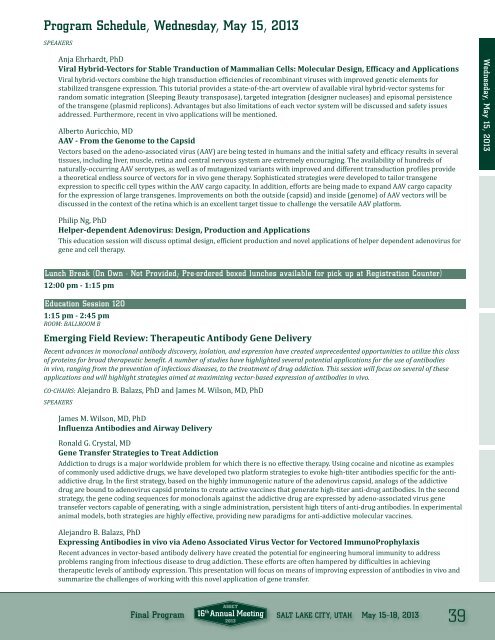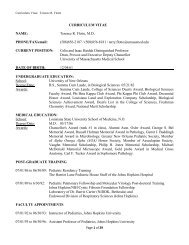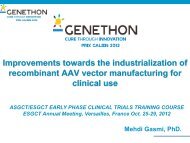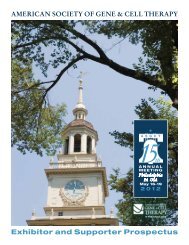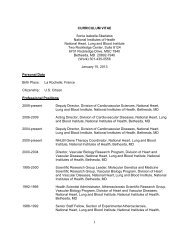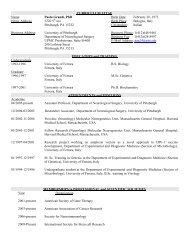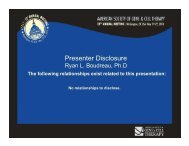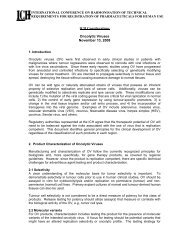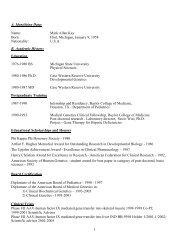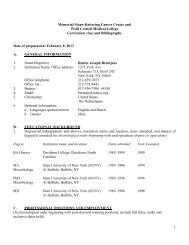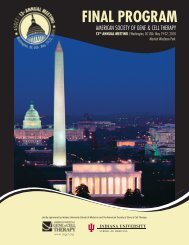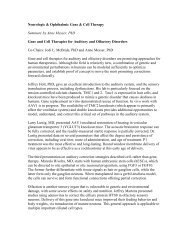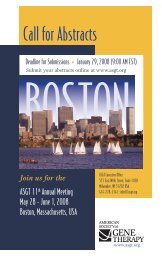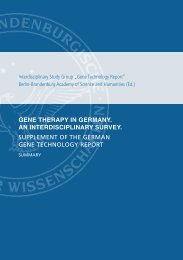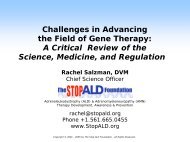Final Program - American Society of Gene & Cell Therapy
Final Program - American Society of Gene & Cell Therapy
Final Program - American Society of Gene & Cell Therapy
Create successful ePaper yourself
Turn your PDF publications into a flip-book with our unique Google optimized e-Paper software.
<strong>Program</strong> Schedule, Wednesday, May 15, 2013<br />
SPEAKERS<br />
Anja Ehrhardt, PhD<br />
Viral Hybrid-Vectors for Stable Tranduction <strong>of</strong> Mammalian <strong>Cell</strong>s: Molecular Design, Eficacy and Applications<br />
Viral hybrid-vectors combine the high transduction eficiencies <strong>of</strong> recombinant viruses with improved genetic elements for<br />
stabilized transgene expression. This tutorial provides a state-<strong>of</strong>-the-art overview <strong>of</strong> available viral hybrid-vector systems for<br />
random somatic integration (Sleeping Beauty transposase), targeted integration (designer nucleases) and episomal persistence<br />
<strong>of</strong> the transgene (plasmid replicons). Advantages but also limitations <strong>of</strong> each vector system will be discussed and safety issues<br />
addressed. Furthermore, recent in vivo applications will be mentioned.<br />
Alberto Auricchio, MD<br />
AAV - From the Genome to the Capsid<br />
Vectors based on the adeno-associated virus (AAV) are being tested in humans and the initial safety and eficacy results in several<br />
tissues, including liver, muscle, retina and central nervous system are extremely encouraging. The availability <strong>of</strong> hundreds <strong>of</strong><br />
naturally-occurring AAV serotypes, as well as <strong>of</strong> mutagenized variants with improved and different transduction proiles provide<br />
a theoretical endless source <strong>of</strong> vectors for in vivo gene therapy. Sophisticated strategies were developed to tailor transgene<br />
expression to speciic cell types within the AAV cargo capacity. In addition, efforts are being made to expand AAV cargo capacity<br />
for the expression <strong>of</strong> large transgenes. Improvements on both the outside (capsid) and inside (genome) <strong>of</strong> AAV vectors will be<br />
discussed in the context <strong>of</strong> the retina which is an excellent target tissue to challenge the versatile AAV platform.<br />
Wednesday, May 15, 2013<br />
Philip Ng, PhD<br />
Helper-dependent Adenovirus: Design, Production and Applications<br />
This education session will discuss optimal design, eficient production and novel applications <strong>of</strong> helper dependent adenovirus for<br />
gene and cell therapy.<br />
Lunch Break (On Own - Not Provided; Pre-ordered boxed lunches available for pick up at Registration Counter)<br />
12:00 pm - 1:15 pm<br />
Education Session 120<br />
1:15 pm - 2:45 pm<br />
ROOM: BALLROOM B<br />
Emerging Field Review: Therapeutic Antibody <strong>Gene</strong> Delivery<br />
Recent advances in monoclonal antibody discovery, isolation, and expression have created unprecedented opportunities to utilize this class<br />
<strong>of</strong> proteins for broad therapeutic beneit. A number <strong>of</strong> studies have highlighted several potential applications for the use <strong>of</strong> antibodies<br />
in vivo, ranging from the prevention <strong>of</strong> infectious diseases, to the treatment <strong>of</strong> drug addiction. This session will focus on several <strong>of</strong> these<br />
applications and will highlight strategies aimed at maximizing vector-based expression <strong>of</strong> antibodies in vivo.<br />
CO-CHAIRS: Alejandro B. Balazs, PhD and James M. Wilson, MD, PhD<br />
SPEAKERS<br />
James M. Wilson, MD, PhD<br />
Inluenza Antibodies and Airway Delivery<br />
Ronald G. Crystal, MD<br />
<strong>Gene</strong> Transfer Strategies to Treat Addiction<br />
Addiction to drugs is a major worldwide problem for which there is no effective therapy. Using cocaine and nicotine as examples<br />
<strong>of</strong> commonly used addictive drugs, we have developed two platform strategies to evoke high-titer antibodies speciic for the antiaddictive<br />
drug. In the irst strategy, based on the highly immunogenic nature <strong>of</strong> the adenovirus capsid, analogs <strong>of</strong> the addictive<br />
drug are bound to adenovirus capsid proteins to create active vaccines that generate high-titer anti-drug antibodies. In the second<br />
strategy, the gene coding sequences for monoclonals against the addictive drug are expressed by adeno-associated virus gene<br />
transefer vectors capable <strong>of</strong> generating, with a single administration, persistent high titers <strong>of</strong> anti-drug antibodies. In experimental<br />
animal models, both strategies are highly effective, providing new paradigms for anti-addictive molecular vaccines.<br />
Alejandro B. Balazs, PhD<br />
Expressing Antibodies in vivo via Adeno Associated Virus Vector for Vectored ImmunoProphylaxis<br />
Recent advances in vector-based antibody delivery have created the potential for engineering humoral immunity to address<br />
problems ranging from infectious disease to drug addiction. These efforts are <strong>of</strong>ten hampered by dificulties in achieving<br />
therapeutic levels <strong>of</strong> antibody expression. This presentation will focus on means <strong>of</strong> improving expression <strong>of</strong> antibodies in vivo and<br />
summarize the challenges <strong>of</strong> working with this novel application <strong>of</strong> gene transfer.<br />
<strong>Final</strong> <strong>Program</strong> SALT LAKE CITY, UTAH May 15–18, 2013<br />
39


